UCL's 2023 Millennium Fellows make strides in achieving SDG goals
Image courtesy of Leila Lai
In affiliation with the United Nations Academic Impact, the Millennium Fellowship is a semester-long leadership programme dedicated to encouraging undergraduate leaders to initiate social impacts related to the UN Sustainable Development Goals in their local communities. The 20 students from UCL chosen from the 44000 global applicants to 2023’s Millennium Fellows have since made impressive social impacts in the past three months.
For example, Gaelic Jara-Reinhold’s co-founded start-up "eNOugh" has been shortlisted by Design Week as one of the 100 pioneering initiatives around the globe reflecting the COP28 UAE agenda. Targeting SDG 11 “Sustainable Cities & Communities”, eNOugh is in the process of developing a wearable AI-powered smart badge that aims to revolutionise personal safety for individuals; particularly children, elderly and women, walking alone at night. The badge employs features such as awareness lights, alarms, cameras, and AI-driven assistance. Gaelic believes that eNOugh has the potential to empower vulnerable populations to walk along at night with more confidence and a peace of mind. His project has been recognised by Santander X, and is currently expecting to pitch their project at Santander X's upcoming semi-finals.
Another innovative project comes from two medical students at UCL; Poppy Pierce and Alexandra Aung. Their project “Fresh Start SMS” targets SDG 10 “Reduced Inequality'' and SDG 6 “Clean Water and Sanitation", by providing hygiene kits via text messages to homeless families with children under 5. It highlights the impact of poor hygiene practices on the physical and mental health of homeless communities and the social welfare system's neglect in offering individualised hygiene support for them. Despite the perceived barrier of mobile phones being inaccessible to this population, their research shows that most of the homeless population do own some form of a functional phone. Poppy and Alexandra have now negotiated with a couple of third sector agencies, and are actively seeking funding to expand their impact.
With focus on students at UCL’s Institute of Education, Leila Lai and Jiayi Zhang have begun a project titled “Global Citizens Conscious for Change”. With the aim of providing a toolkit for third culture youth who have been struggling to form coherent cultural identities. Their team interviewed three psychology professors from University of Birmingham and UCL, obtained quantitative data from 200 individuals online and qualitative data from 10 individuals with multicultural identity around UCL. This research produced a comprehensive handbook with touching relatable stories, expert insights and practical psychological exercises to help future third culture youth navigate their acculturation process between their heritage and host culture in a scientifically informed manner. Touching on SDG 16 “Peace, Justice & Strong Institutions”, their team have now established partnerships with therapy organisations such as EZ Wellbeing, which have agreed to disseminate their handbook to young immigrants in need.
Another project worth highlighting is the “Data Against Hunger” project initiated by Veronika Liutarevich and Hosung An. Targeting SDG 2 “Zero Hunger”, they aim to reduce food waste around London by redistributing unwanted food to food banks in need utilising a self-programmed data platform. Their team found that existing organisations targeting to reduce hunger, typically lack a system to track food banks’ needs in real-time. In the meantime, organisations targeting to reduce food waste typically lack a system to track the type of surplus food produced by restaurants. Their team obtained insights from the Millennium Fellowship training sessions, and decided to adopt a "sidekick" approach, allowing the local community and food banks to take the lead as change-makers. They developed a database where they record individualised requests submitted by food banks and automatically link them with surplus food from restaurants in real-time. In collaboration with UCL's Zero Food Waste Society, their initiative has not only optimised the process of food redistribution but also reinforced the role of community-driven solutions in addressing critical social challenges related to hunger.
The projects by other UCL Millennium Fellows include efforts to support girls' education in Afghanistan, the development of a platform to enhance women's financial literacy, and initiatives to establish better working conditions for mothers returning to academia postpartum. These projects, while varied, all share a common goal of addressing critical societal issues and empowering underrepresented groups.
Fellows were also able to connect with world-class change-makers, such as Nobel Peace Prize laureate Malala Yousafzai; nine-time United Nations speaker Sinead Bovell; former organiser for Barack Obama's political campaigns Kate Cummings. Although three months was a short time to drive drastic transformations in any scenario, UCL’s Millennium Fellows found the programme beneficial and have become firmly committed to creating sustainable change in their respective fields.

